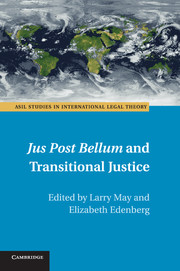
-
Select format
-
- Publisher:
- Cambridge University Press
- Publication date:
- October 2013
- October 2013
- ISBN:
- 9781139628594
- 9781107040175
- 9781107546370
- Dimensions:
- (228 x 152 mm)
- Weight & Pages:
- 0.6kg, 352 Pages
- Dimensions:
- (229 x 152 mm)
- Weight & Pages:
- 0.51kg, 348 Pages
- Subjects:
- Public International Law, Law, Humanitarian Law, Jurisprudence
You may already have access via personal or institutional login- Subjects:
- Public International Law, Law, Humanitarian Law, Jurisprudence
Book description
This collection of essays brings together jus post bellum and transitional justice theorists to explore the legal and moral questions that arise at the end of war and in the transition to less oppressive regimes. Transitional justice and jus post bellum share in common many concepts that will be explored in this volume. In both transitional justice and jus post bellum, retribution is crucial. In some contexts criminal trials will need to be held, and in others truth commissions and other hybrid trials will be considered more appropriate means for securing some form of retribution. But there is a difference between how jus post bellum is conceptualized, where the key is securing peace, and transitional justice, where the key is often greater democratization. This collection of essays highlights both the overlap and the differences between these emerging bodies of scholarship and incipient law.
Contents
Metrics
Full text views
Full text views help Loading metrics...
Loading metrics...
* Views captured on Cambridge Core between #date#. This data will be updated every 24 hours.
Usage data cannot currently be displayed.
Accessibility standard: Unknown
Why this information is here
This section outlines the accessibility features of this content - including support for screen readers, full keyboard navigation and high-contrast display options. This may not be relevant for you.
Accessibility Information
Accessibility compliance for the PDF of this book is currently unknown and may be updated in the future.


